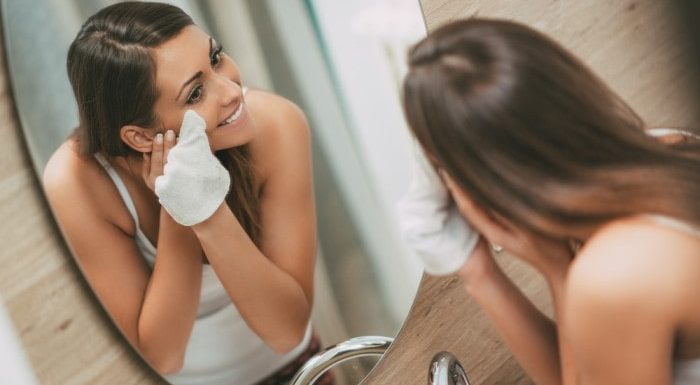
One of the most important parts of a skincare routine is removing makeup and removing it properly not only prolongs the elasticity of your skin but also allows it to breathe freely at night, rejuvenating it so you feel refreshed when waking up in the morning.
Removing makeup hastily results in your eyes looking red and irritated from all of the scrubbing and traces of foundation and powder which still remain on your face.
Before you begin removing makeup, pull your hair back ensuring your entire face is exposed since a lot of makeup builds up around your hairline. Start with your eyes especially if you’re accustomed to wearing mascara or an eye shadow. You will need a cotton pad cleanser or makeup eraser cloth, oil moisturiser and some warm water. Jojoba oil is super hydrating and perfect for cleaning around the eyes. Ensure you minimise the amount of remover you’re using on your makeup eraser cloth to a minimum.
To get the best results, dampen the makeup eraser cloth with warm water and start by moving in an upward direction from the nose to the cheek. Gradually clean your chin using the same upward motion and then with gentle strokes clean the neck the forehead. If you’re using a moisturiser, massage in a circular motion.
You can also switch to the upward direction in places where you want a deep moisturising action. Once you’re done, gently tap all over the face as this increases blood circulation and helps the moisturiser to set in.
Removing Makeup With Extra-Virgin Oil
The extra-virgin olive oil you can find in supermarkets or in your kitchen comes in handy as a makeup remover. Pour a little bit of oil in the palm of your hand and gently massage your face from the forehead in a circular motion. The olive oil will dissolve all the makeup and clean out the pores as well.
Make sure you don’t leave the oil on your skin for too long and once you rinse out your face, use a good quality makeup remover cloth to wipe away any remaining traces of makeup.
Steaming Away Your Makeup
If you come home after a tiring day at work, only to find that you’ve run out of makeup remover, you can still remove your makeup using nothing but steam. Fill up your wash basin with hot water. Lean over the basin, allowing the steam to open up the pores in your face. Wash your face and use your makeup remover cloth to wipe away traces of makeup that remain.
It’s also a good idea to steam clean your face to get rid of any stubborn traces of makeup which don’t come off easily. Steaming is the secret weapon top models use to cleanse their face and keep pores from being clogged.
Using Milk to Remove Makeup
Most people are unaware that milk is also effective in removing makeup naturally. Milk contains lactic acid which gently exfoliates your skin. The fat present in the skin acts as a moisturiser and complements the exfoliating action of the lactic acid.
To use milk as a makeup remover, soak a cotton ball in milk and rub it gently on the face to remove the makeup and then wash your face with warm water. If you have oily skin use skimmed milk or use whole milk if you have dry skin.
Ensuring All Traces of Makeup are Removed
If you can find some makeup residue left on the makeup removal cloth after use, it means your makeup has not been removed properly which can cause wrinkles, dryness, breakouts, blocked pores and blackheads.
This is why it is very important to remove the makeup completely. Once you have removed all the makeup, wash your face with soap and water and wipe your face clean with a towel, to complete the process of cleansing your face thoroughly. When wiping any cleanser residue which could be left on the skin, sometimes there can be fibres from your towel left over, so dust anything that you know is not supposed to be on your skin.
Although it can be a struggle to take off your makeup before you go to bed because you’re too tired to complete the task, it’s really important to fight back the weariness and make an effort to get it done. While sleeping your skin regenerates itself, however, if the pores on your facial skin are filled with makeup, they will be unable to breathe and disable the restoration from occurring.
